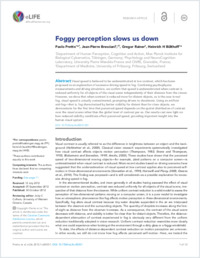Foggy perception slows us down
- Pretto, Paolo Department of Human Perception, Cognition and Action, Max Planck Institute for Biological Cybernetics, Tübingen, Germany
- Bresciani, Jean-Pierre Psychology and NeuroCognition Laboratory, University Pierre Mendès-France and CNRS, Grenoble, France - Department of Medicine, University of Fribourg, Switzerland
- Rainer, Gregor Department of Medicine, University of Fribourg, Switzerland
- Bülthoff, Heinrich H. Department of Human Perception, Cognition and Action, Max Planck Institute for Biological Cybernetics, Tübingen, Germany
-
30.10.2012
Published in:
- eLife. - 2012, vol. 1, p. e00031
English
Visual speed is believed to be underestimated at low contrast, which has been proposed as an explanation of excessive driving speed in fog. Combining psychophysics measurements and driving simulation, we confirm that speed is underestimated when contrast is reduced uniformly for all objects of the visual scene independently of their distance from the viewer. However, we show that when contrast is reduced more for distant objects, as is the case in real fog, visual speed is actually overestimated, prompting drivers to decelerate. Using an artificial anti-fog—that is, fog characterized by better visibility for distant than for close objects, we demonstrate for the first time that perceived speed depends on the spatial distribution of contrast over the visual scene rather than the global level of contrast per se. Our results cast new light on how reduced visibility conditions affect perceived speed, providing important insight into the human visual system
- Faculty
- Faculté des sciences et de médecine
- Department
- Département de Médecine
- Language
-
- English
- Classification
- Biological sciences
- License
-
License undefined
- Identifiers
-
- RERO DOC 31335
- DOI 10.7554/eLife.00031
- Persistent URL
- https://folia.unifr.ch/unifr/documents/302822
Statistics
Document views: 112
File downloads:
- pdf: 184
